#career advice for writers
Text
Why writing books is a career like no other, and 9 takeaways for doing it
I’ve had an email from a high school student who’s writing an English assignment on careers he would like to follow. He said:
Would you answer a few questions about your job journey? I’m very interested in what you do.
His questions were fairly standard, and they made me realise how most creative careers are anything but. They’re unpredictable and weird.Here are my answers, and I’m really…

View On WordPress
#advice to aspiring writers#authors with other jobs#career advice for authors#career advice for writers#how to become a writer#how to become an author#how to get a writing career#how to learn to be a writer#how to learn to be an author#second jobs#writing careers#writing courses
0 notes
Text
helpful sites for writers
i have a little collection of websites i tend to use for coming up with ideas, naming people or places, keeping clear visuals or logistics, writing basics about places i've never been to, and so on. i tend to do a lot of research, but sometimes you just need quick references, right? so i thought i'd share some of them!
Behind the Name; good for name meanings but also just random name ideas, regardless of meanings.
Fantasy Name Generator; this link goes to the town name generator, which i use most, but there are lots of silly/fun/good inspo generators on there!
Age Calculator; for remembering how old characters are in Y month in Z year. i use this constantly.
Height Comparison; i love this for the height visuals; does character A come up to character B's shoulder? are they a head taller? what does that look like, height-wise? the chart feature is great!
Child Development Guide; what can a (neurotypical, average) 5-year-old do at that age? this is a super handy quickguide for that, with the obviously huge caveat that children develop at different paces and this is not comprehensive or accurate for every child ever. i like it as a starting point, though!
Weather Spark; good for average temperatures and weather checking!
Green's Dictionary of Slang; good for looking up "would x say this?" or "what does this phrase mean in this context?" i love the timeline because it shows when the phrase was historically in use. this is english only, though; i dig a little harder for resources like this in other languages.
#writing#writing tips#writer resources#writing advice#helpful links#etc.#handy#also the magical careers generator#literally used that earlier tonight#also feel free to add to this list @ anyone
11K notes
·
View notes
Text
Femme Fatale Guide: 15 Essential Business Skills Everyone Should Master
Articulate, confident communication
Crafting effective, compelling pitches
Operating and communicating through a solution-oriented framework
Research of all types (Google, market research, studies, polls, interpersonal conversations, etc.)
Learning how to streamline, edit, and organize information in a clear and logical way
Accumulating high-level working knowledge/proficiency in all tools and programs directly related to your type of work/industry
Budgeting and financial optimization (investment, tax benefits, etc.)
Reading and interpreting legal contracts/documents
Setting rates, boundaries, and learning when/how to delegate
Good posture, direct eye contact, and a firm handshake
Building streamlined systems for onboarding, different repeat project scopes/workflows, and KPI measuring
The art of following up, listening to (potential) clients' needs, asking thoughtful questions, and benefit-oriented salesmanship
Consistently reading, learning, and studying current events/cultural platforms/industry and field-related knowledge
How to spot customer/client/business partner red flags
Self-management, task/project prioritization, and optimization of your personal energy clock + levels
#femmefatalevibe#business tips#career advice#career path#career goals#professionalism#women business#female writers#female entrepreneurs#professional development#personal development#relationship advice#people skills#social skills#life lessons#higher self#personal growth#boundaries#self esteem#self confidence#conflict resolution#communication skills#interpersonal communication
1K notes
·
View notes
Text
Remember:
We only fail when we stop trying.
#novel writing#poetry#young author#viralpost#viral#writers and poets#writers on tumblr#self love#self care#new writing#foryoupage#foryou#self esteem#school advice#career advice
15 notes
·
View notes
Text

Anyone Can Be A Screenwriter... But Here Is What You Need To Know First - Jill Chamberlain
Watch the video interview on Youtube here.
#writing#screenwriting#writers on tumblr#career#hollywood#los angeles#la life#entertainment industry#film jobs#writer problems#writerscommunity#screenwriters on tumblr#script#writeblr#writer stuff#creative writing#female writers#scriptwriting#writing advice#writing tips#writing tools#writing resources#writing help#on writing#writing life#writing problems#story#storytelling#author#short story
3 notes
·
View notes
Text
The Best Careers for Creative Writers (Without College Degrees)
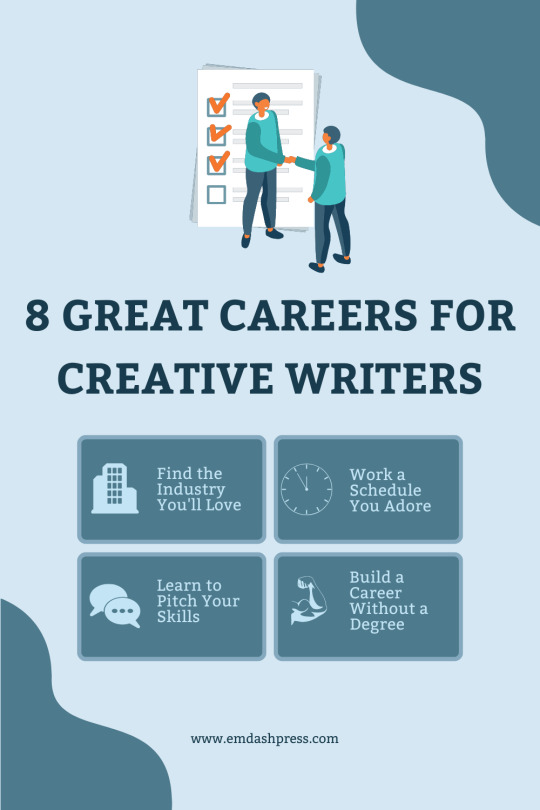
Writers often thrive in these careers with and without college degrees. Use the tips in my latest blog post to pitch your skills effectively and craft a professional future that pays the bills and fulfills your ambitions.
Read more here!
#jobs for writers#creative writing jobs#writing jobs#career tips for writers#career tips#career advice#writing career tips#writing careers
31 notes
·
View notes
Text
How to Write and Create for Yourself When You Make Writing Your Career
I made a post about why it’s important to write and create for yourself first, rather than do it for external validation or pleasing other people. And on that post, I received this wonderful question from @hotherus-the-blind :
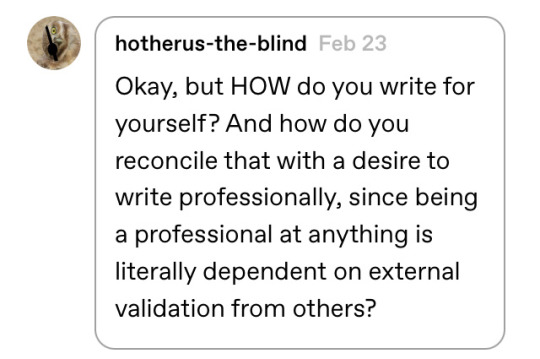
This is a question I just asked myself not too long ago, so you are definitely not the only one wondering.
It isn’t easy. I’ll start with that. It's one thing to write fanfiction or hobby-work (and even that has the pressure of wanting people to like your work). But the pressure of a writing career only makes writing for yourself first harder, and seemingly impossible.
But the short answer to your question is simply this:
All successful professional writers do write for themselves first, because you can’t be successful if you don’t write and create for yourself first.
(And we are glad it works this way!)
Believe me—I have a decade of failure and rejection from trying to write for others first to prove it.
Why You Still Have to Write for Yourself First, Even for a Writing Career
10 years ago I decided that I wanted to write TV shows and publish novels for a living. An ambition I still have.
Prior to that decision, I used to write only for myself. I wrote stories since I was a little kid, and only cared about what I found interesting. And when I write fanfiction, I feel much more comfortable writing for myself first.
But for the past 10 years, I took writing classes and screenwriting workshops and spent that decade trying to learn how to write stuff people would want to watch and read, stuff that would get me hired (which, potato, po-tah-to, right?). What other people would be interested in reading was my only focus. I just wanted to be successful at this; I no longer even remembered that I chose this career because I love to write.
But despite the fact that not writing for yourself first is unenjoyable and ruins something you love to do...
It also is inevitably unsuccessful.
These past 10 years, I came up with concepts that I believed were interesting, based off of what I learned in classes, thinking things like “they did this in Breaking Bad and people love that so I should try it!” or “these two ideas are such opposites; it would be so interesting if I put them together!”
But the problem was that I wasn’t interested.
And that was the important piece of the puzzle I had been missing.
I was writing things I thought were cool or unique or trending. As I was writing, my only thought was of the person who would be reading it; what they would think. But even as I came up with those ideas… they never made it past the idea.
Because I was so uninterested, I didn’t even want to write them. But even when I forced myself to write them, they were cold and boring and uninteresting. And when I shared them with my teachers and friends, they said the same thing; it was impersonal, boring, unemotional. There was no heart and soul. One of my teachers asked me why I was writing that story, and I answered, "Because I think it can be good."
And then he kindly told me: “The stories you write should be ones you feel the need to tell, that you have this desire to write. Stories where you are the only person in the world who can tell that story, because of the way you tell it and the emotion it comes from. That is the connection we’ll feel when we read it.”
My teachers' philosophy, as successful professional writers in the business, is that writing strong compelling stories that other people will be interested in is only as strong as your own interest in what you are writing. (A concept I kept straying from, since I was so terrified and focused on other peoples’ impressions of my work.)
One of my writing teachers is Corey Mandell, who teaches this workshop called Creative Integration. In this workshop, they teach that the trifecta of writing is a harmony of these three things:
1. What other people are interested in
2. What the characters naturally would do in the given situation
3. What you, the writer, care about and find interesting
(here's a video of him talking about this stuff)
When you have all three components fulfilled, you are writing your BEST work, and your most SUCCESSFUL work.
If you are missing any of the three, your story will be lacking.
That includes, especially, your own interest in what you're writing.
And I would even argue that if you had to only pick one, the most important one is the 3rd---what you're interested in. Something filled with your emotion. Because I can think of so many stories that I felt the passion in, even if the plot wasn't all that great. I forgive and still read a story with a bad plot if the emotion is great. I don't often forgive an emotionless story just to see a cool plot.
Additionally, my teacher always tell us this in classes, and I remind myself of every single day now:
“Writing is an energy-transference business. What you felt when you wrote that story is what the reader will feel when they read it. If you felt nothing, they’ll feel nothing.”
Your interest in the story is directly related to your success. You need to feel something if you want other people to feel something.
And this, my friend, is exactly why you need to write for yourself first in order to be successful in a writing career.
Here's some proof of uber successful writers who wrote for themselves first:
If you go to any author or screenwriter or artist who wrote or made something you love, and you ask them, “What compelled you to write this?” You won’t get an answer of: “I thought it’d be cool and people would like it.” Or, “I thought it would sell and be successful.”
99% of the time, it was inspired by something personal to them; it was a story they had to tell.
Take the TV show Psych for example. Psych is a show about a guy who grew up with a detective father who groomed him to be a detective for his entire childhood. But his father sucked as a dad. Due to that bad relationship, instead of becoming a detective like he was trained to be, Shawn pretends to be a psychic to solve crimes rather than do what his father wanted him to do (become a proper detective). The show is a comedy of antics and hilarity, but the underlying story is that of a healing relationship between father and son.
Check out the actual inspiration behind Psych:
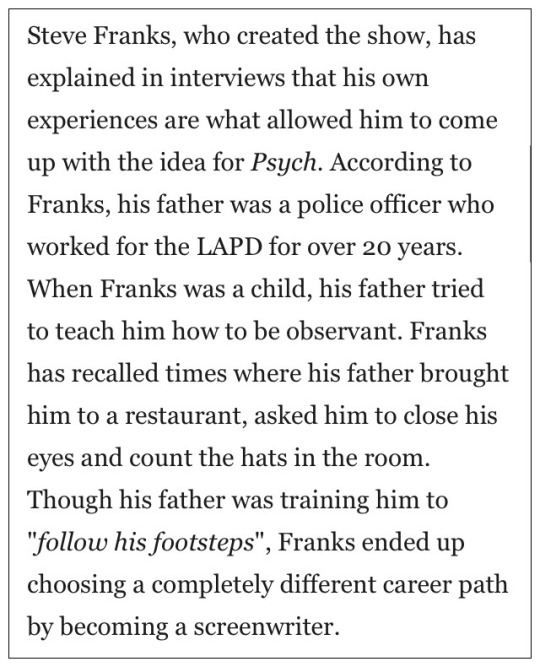
(x)
Is this show a biography? Not at all. Putting your soul into your work doesn’t mean it has to be your literal life. But Steve Franks put his pain into that show, his heart and his soul. It was a story no one else in the world could tell, because the main character of that show was a reflection of him. He didn’t just set out to write a detective show with a funny main character; he wrote a show about a broken relationship between father and son, and told it through a show about crime solving. That’s what makes it a show only he could write.
That’s why we watch Psych. Not for the crimes. For the emotion that Steve Franks poured into it.
How about the inspiration behind Breaking Bad?

Percy Jackson?
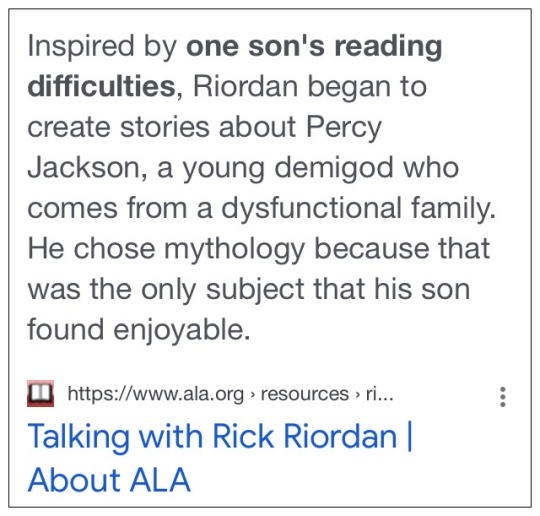
Game of Thrones? (A Song of Ice and Fire) (by author George R. R. Martin, quote from him below):
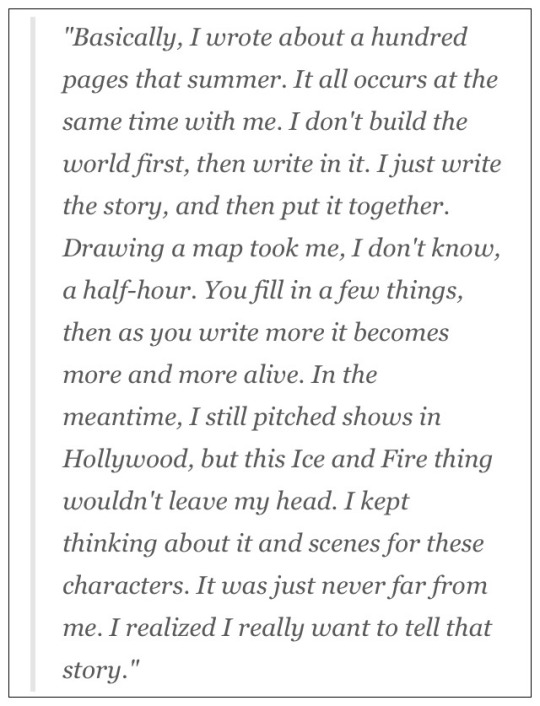
(x)
That last sentence is really amazing: "I realized I really want to tell that story."
That is what we should strive to say about all of our own stories.
Try this with any book or tv show or movie you love. You'll find a personal inspiration behind it to prove that those writers were successful writing a story that they felt personally compelled to write.
Here's my favorite quote on the subject that I keep over my desk:

How to Write for Yourself First
Writing for yourself first means that if you write something, and no one in the entire world could ever see, watch or read it, ever, you still feel that it was worth writing. It made you feel good to write. It was something you wanted and needed to write.
There's a quote from an episode of the TV show Leverage where a character tells another character (Eliot Spencer), "You fight like something is trying to get out of you." I think about that quote in terms of my own writing: let's write like something is trying to get out of us.
I spent the past 10 years telling myself, “I just want to write a story that works.” I never used to write that way before. I used to go, “Oooooh, what a cool idea! I want to see what will happen!” And just sit down and write. Or, I’d be angry or upset or afraid and I’d write out of that emotion, and something unique and wonderful would come out and I would be able to cope and pour all the emotions into it. I learned that I write and create to feel better. And realizing that changed everything for me. Because for me, if it doesn’t make me feel better, it isn’t writing.
Why did you used to write, before you decided on this career?
Why did you decide on this career?
What compels you to write? What would make you happy to write? What would make you smile? Laugh? Cry? Cope? Feel better? Deal with your anger? Live vicariously through a character in a fantasy world you’d rather live in? What do you want to write?
Sit down, open a new document or blank page, and ask yourself: if you were to show no one what you write right now, what would you write for yourself? For your own eyes? You aren’t allowed to share this with anyone else, so what would you like to write? It doesn’t have to be incredible, it doesn’t have to impress anyone. It can be silly or stupid or embarrassing or offensive or heartbreaking—anything. It’s just for you to enjoy the process of writing it. Are you upset about something? Are you angry? Think about a crush you have; write a scene of a fantasy date they take you on. Write about a character with superpowers you’d like to have, or someone going on an adventure you’d like to go on—anything your heart desires.
What would make you, and only you, happy to write about?
What would make you feel anything to write about?
If you want to be a writer professionally, I assume it’s because you enjoy writing enough to want it to be a career. Which means that at some point in your life, you were writing before you were thinking about money or other peoples’ feedback.
Try to think back to when you were writing as a kid. Why did you write? What compelled you to write? What did you want to feel or accomplish when you wrote? (I also used this uquiz to help rediscover why I write).
I may not be able to guarantee that people will love what you write (though if you’re interested, it’s highly likely other people will be too!)
But I can guarantee that if you are not interested, if your heart is not in it, then no one else will be interested in it, either.
I spent 10 full years trying to write in a way that would interest other people, putting my interest aside completely. And I have nothing but rejections to show for it.
Am I professional writer with oodles of success right now?
No.
But I can tell you one thing: after 10 years of writing for other people first and making myself miserable, I've learned that writing for others first doesn't work. I tried damn hard to make it work, and still failed. But the most important part?
I don’t even want to be successful that way.
I had to start fresh and start writing from a place of emotion, pain, love, need again. And finally there are stories emerging that I actually care about again. Because I realized that I would never be successful unless I do this. But more importantly…
I will never be happy as a writer (or a person) unless I do this.
Personally, I would much rather write something where my emotions bled onto the page and get it rejected than write a boring draft for others that makes a million dollars.
The bottom line is you can’t capture someone else’s heart with your story until your own heart is somewhere inside it, leading the way.
Yes, it is important to interest other people with your stories if you aim to be a successful professional writer.
But only after you write for yourself, first.
#writing advice#writing#external validation#writing for yourself#writeblr#creative writing#writing community#writers of tumblr#professional writing#career writing#writing tips#writing help#advice#writing inspiration#writing motivation#original writing#tv writing#original fiction#fanfiction#fanfiction writing#fanfic writers#original writers#authors#writer#psych#breaking bad#Percy Jackson#game of thrones
24 notes
·
View notes
Text
Is work addiction-workaholic a real problem or is it a blessing?
As I get older and do the transition from a student to an actual working person, I start to think what makes a person a workaholic. And when I think about someone who is a workaholic, I think that they make sacrifices for their career for their job. But I truly believe that in order to be successful in whatever you do ,you have to make sacrifices. It’s like that in everything you do in order to have a good relationship you have to make sacrifices, in order to get slim and in shape and you have to make sacrifices. So the question is what sacrifices are you willing to make and what is more important to you in your own life. Is it relationships? Is it career ? Is it health? Is it creativity? So it really comes down to what life is to you. Some people think it’s worth to sacrifice everything for a relationship. Though other people think the only sacrifice someone needs to do is that in order to get a healthy body. “Healthy body, healthy mind, healthy soul, healthy life !” So why not put a job, a career. as something important to you. If you know you can get whatever you want in life if you try why wouldn’t you try? If you knew you could get to the top? It’s guaranteed that you will succeed if you try and try and try again and fail and succeed. How I see it it’s that work will never be done. You can always better yourself even if you have the least stressful or difficult task to do at your job you can always make room for improvement. So when I sit and think oh, I did my tasks for work today it doesn’t mean that I don’t have work to do. It just means I did the least amount of work expected from me. Work will never be finished. So basically a workaholic is someone who always tries to improve and does the sacrifices that are required to do so. I mean not everyone will see that he’s trying to improve himself, because of the sacrifices he makes. The sacrifices will eventually hurt other parts of the person’s life, and he, or she will be responsible to identify the hurt and try to find out if the sacrifice is worth the hurt. What are your thoughts on this?

#thoughts#work life#balance#workaholics#career#sacrifice#work advice#advice#your thoughts#interesting#blog#writers on tumblr#writing#writeblr#point of view
4 notes
·
View notes
Text
#writer#writers#writing community#make money as a writer#writing for money#earning as a writer#creative writing#writing advice#advice for writers#careers for writers#writeblr#novlr#writers of tumblr#writerblr#writers life#writing#creative writers
9 notes
·
View notes
Text
The post about ND creators and advice to get things done... lol twice this year I forgot myself and tried to model how I work on more successful people than me, and both times I made things worse and only now am I like, oh right right, those are people with functioning brains. Riiiiiight.
So, introspect, the fact that my year was such a creative disaster makes more sense to me now, and hopefully I will stop feeling like I've let myself down. (I mean, I have, just not in the way that I thought I was. Just through being a dumbass. I mean, this threw me off so much, I haven't even been reading like I normally do. Terrible. It's no wonder.)
I mean that and also Raymond gave me an ulcer.
Yes, I am still blaming Ray.
#personal#writer stuff#do not take life or career advice from people who do not have broken brains i tell you#i mean unless you also have an unbroken brain then go forth! be bold and do things that way!#i should call it something else before someone yells at me about saying broken but eeehhhh#going to put in headphones now to maybe trick my brain into doing things
6 notes
·
View notes
Text
The Pros and Cons of Self-Publishing vs. Traditional Publishing
Self-publishing and traditional publishing are two distinct paths for authors to get their work out into the world. Both have their advantages and disadvantages, and it’s important for authors to weigh the pros and cons before making a decision. In this post, we’ll take a closer look at the key differences between self-publishing and traditional publishing, and the benefits and drawbacks of…

View On WordPress
#Author Rights#Book Distribution#Book Industry#Book Marketing#Book Production#Book Promotion#Book Sales#Creative Control#Literary Agents#Publishing#Publishing Advice#Publishing Contracts#Publishing Industry#Royalty Payments#self-publishing#Traditional Publishing#Writers Resources#Writing#Writing Business#Writing Career
5 notes
·
View notes
Note
Publishing ground rules???? My 2018 self is crying because that fic was everything to me 😭😭😭
lol hello???? i love you ❤️ lowkey highkey i'm setting a goal right now to publish a book this summer 👍 cos... why not?! i already have the bare bones 😇 thank you thank you thank you thank you!!
btw-- any published or aspiring writers, editors, reviewers who have any advice for us?
#probs sounds like this is coming out of nowhere which is like yes and no#i am serious too and care more about just sharing a book once in my life-- not necessarily as a concrete career path#i'm just super curious!!#advice#writing#fic#writing advice#self publishing#books#author#writer
3 notes
·
View notes
Text
Femme Fatale Guide: Top Career Tips To Set Yourself Up For Success
Figure out where your skills and passions align. Then determine the lifestyle/work culture you thrive in and what sacrifices you're willing to make in your chosen career path (for some, it's always traveling/talking to people 24/7, working late hours, unpredictable/unconventional hours, potentially lower pay/less predictable income, etc.). It truly depends on your top values, your personality, and your goals/priorities in life.
First focus on getting incredibly talented at your craft. Find a mentor(s) who will push you with their feedback/suggestions. Take classes/skills courses/read books & articles to gain more applicable knowledge/hard skills. Join clubs, apply to internships, volunteer, and request informational interviews in your desired field.
Make your skills marketable. Create a professional resume and/or neat portfolio/collection of work samples. Discover and articulate your USP (that should essentially serve as the backbone of your elevator pitch). Frame your skills through a customer/business-centric lens. How does your experience/skillset solve their problems and help a company/client achieve their goals?
Build a network for yourself. Don't be shy to reach out to companies/individuals who inspire you. Speak with your secondary school teachers and professors for connections. Create peer-to-peer networks, too, so you can grow together. Be a fearless networker and connector. Help others, do favors, and make the person glad they met/hired you. Make it your objective to be memorable through your work ethic/providing high-quality work products and showing up with a motivated & overall positive attitude allows people to like and trust you with their time, clients, money, etc.
Master the art of a killer email/cold pitch. Especially in today's world, learning how to sell yourself through intriguing emails/LinkedIn messages is the key to unlocking potential success. One client or opportunity can create momentum that will be useful years down the line, too.
When in doubt, follow up – on an email, pitch, job opportunity, connection, etc.
Be ruthless and relentless with your research. For new contacts, connections, opportunities, and information to support your pitches/job interviews/networking conversations, new technologies, and trends within your field. Read everything credible you can get your hands on. Display working knowledge and practical applications of these concepts and how they can benefit the person in front of you/their business.
Create systems. For how you structure emails/pitches, conduct research, different types of workflows/ work template structures for different types of projects, time-blocking, client funnels, etc.
Get comfortable with rejection. Use it as a primer for self-reflection and refining your craft/processes or help you pivot your approach to help you achieve your goals. Never take business decisions on behalf of a company personally (and vice versa).
Give yourself breaks, but don't give up. Tapping out for good is the only surefire way to fail at an endeavor. Be flexible in your path, but zeroed in on your goal(s). Learn when to quit or pivot, and when it's time to coast or seek growth.
#career advice#career tips#career path#female entrepreneurs#female writers#entreprenuership#freelancewriter#freelancing#women writers#professional growth#networking#life advice#glow up tips#femme fatale#it girl#high value woman#the feminine urge#high value mindset#female excellence#female power#queen energy#dream girl#successhabits#level up#femmefatalevibe
530 notes
·
View notes
Text
No one's perfect and that's perfection on its own..

#novel writing#poetry#young author#viralpost#viral#writers and poets#writers on tumblr#self love#self care#new writing#inspiring quotes#life quote#quotation#quoteoftheday#quotes#school advice#career advice#foryoupage
10 notes
·
View notes
Text

Entertainment Business School - Kaia Alexander [FULL INTERVIEW]
Watch the video interview on Youtube here.
#screenwriting#writing#writers#script#film industry#entertainment career#film jobs#entertainment industry#hollywood#los angeles#women in film#filmmakers#film and tv#tv writers#writing a screenplay#job interview#career#moving to los angeles#writing life#writer community#writing advice#la life
3 notes
·
View notes
Text
Share What You Love Doing, and Do It On Purpose~
Hello, everyone,
Sometimes I get discouraged about my writing, wondering if I will ever get published. Every time I go to Barnes and Noble, I’m always wondering how some of the silliest and weirdest books get published. A person could write about a toilet, and it would get published. I think a part of it has to do with the fact that I incorporate God in my books, but that doesn’t mean I’m going…
View On WordPress
2 notes
·
View notes